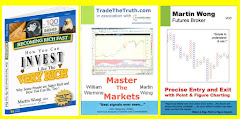By Elizabeth Stanton
May 17 (Bloomberg) -- U.S. stocks rose this week, sending the Standard & Poor's 500 Index to the highest level since January, on speculation global economic growth will drive demand for personal computers and fuel.
Intel Corp. led semiconductor companies in the S&P 500 to a 2008 peak on a Friedman Billings Ramsey & Co. report that orders are improving. Peabody Energy Corp. joined 19 other S&P 500 fuel producers in reaching 52-week highs as crude oil surpassed $127 a barrel for the first time. Most stocks declined yesterday after consumer confidence dropped to a 28-year low.
The S&P 500 climbed 2.7 percent this week to 1,425.35, the highest since Jan. 3. The Dow Jones Industrial Average rose 1.9 percent to 12,986.80. The Nasdaq Composite Index added 3.4 percent to 2,528.85. The Russell 2000 Index of small-cap stocks advanced 2.9 percent to 741.17.
``We seem to have experienced a mid-cycle slowdown, not a hard landing,'' said David Goerz, the San Francisco-based chief investment officer at Highmark Capital Management, which oversees $22 billion. ``If you don't have an economic slowdown, technology should work well.''
The S&P 500 extended its rebound from a 19-month low in March to 12 percent. The recovery followed seven interest-rate cuts by the Federal Reserve, which also extended a record $14.4 billion in direct loans to commercial banks to facilitate lending. The worst housing slump in a generation hurt the value of mortgage-related investments, depleting banks' capital.
88% Profit Slump
Financial companies in the S&P 500 reported an 88 percent decline in first-quarter earnings, according to Bloomberg data. Excluding banks, brokerages and real-estate firms, average earnings rose 8.3 percent for the S&P 500, based on reports by 353 companies since April 7.
Companies scheduled to report first-quarter results next week include Hewlett-Packard Co., which suffered the biggest decline among the 30 companies in the Dow average this week after agreeing to buy Electronic Data Systems Corp. for $13.2 billion.
Other companies slated to release results include Home Depot Inc., Campbell Soup Co., Medtronic Inc. and Target Corp.
Hewlett-Packard, the biggest personal-computer maker, fell 3.8 percent to $47.29 on concern the price-tag for EDS is too high. EDS, the second-largest computer-services provider after International Business Machines Corp., rose 29 percent to $24.33 for the biggest gain in the S&P 500.
Intel, the world's largest chipmaker, rose 7 percent to $25. Friedman Billings Ramsey analyst Craig Berger in a May 15 report said semiconductor companies will benefit from improving global demand for personal computers.
China Earthquake
Peabody Energy, the largest U.S. coal producer, jumped 15 percent to a record $78.83. Coal companies in S&P indexes rose to a record after China, the world's largest producer, temporarily closed mines following the nation's most powerful earthquake since 1950.
Crude oil rose to a record $127.82 a barrel in New York. That sent energy companies including Chevron Corp., ConocoPhillips, Occidental Petroleum Corp. and Halliburton Co. to all-time highs.
Alcoa Inc. had the biggest gain in the Dow average, rising 11 percent to $43.15. The world's third-largest aluminum producer is a possible acquisition target as Rio Tinto Group and Brazil's Cia. Vale do Rio Doce each potentially seek $50 billion takeovers, Ernst & Young LLC said.
Clear Channel Communications Inc. climbed 16 percent to $34.84. The largest U.S. radio broadcaster agreed to a buyout at a reduced price after the private-equity buyers and banks financing the deal reached a legal settlement. Citigroup Inc. and five other banks became unwilling to finance last year's higher offer amid declines in radio advertising sales and investor appetite for loans.
Icahn Threatens Fight
Yahoo! Inc. rose 6.7 percent to $27.66. Billionaire investor Carl Icahn threatened the second-most-popular Internet search engine with a proxy battle for control of its board. He is urging Yahoo to resume takeover talks with Microsoft Corp., the world's largest software maker, which had offered $47.5 billion.
Ambac Financial Group Inc. retreated 12 percent to $3.85 for the steepest drop in the S&P 500. The second-largest U.S. bond insurer had ``meaningfully'' higher losses on home-equity loans and collateralized debt obligations than anticipated, raising concern about its Aaa status, Moody's Investors Service said.
Whole Foods Market Inc. tumbled 11 percent to $29.06 for the second-biggest decline in the S&P 500 and its biggest drop since November 2006. The largest U.S. natural-foods grocer said second-quarter profit fell more than analysts estimated and sales growth slowed.
Options Drop
The Russell 2000 Index of companies whose median market value is 95 percent smaller than the S&P 500's rose 2.9 percent to 741.17. The Chicago Board Options Exchange Volatility Index, the benchmark for U.S. options prices, declined 15 percent to 16.47. The so-called VIX, which gauges the cost of insuring against stock-price losses, closed at the lowest level since Oct. 9, the day the S&P 500 peaked, on May 15.
Treasury securities fell as rising stock prices curbed demand for fixed-rate investments. The two-year note's yield, which moves inversely to its price, climbed to 2.44 percent from 2.24 percent.
The index of U.S. leading indicators was probably unchanged in April, signaling a prolonged stagnation in growth, economists said before a May 19 report. The Fed is scheduled to release on May 21 the minutes of its most recent interest-rate meeting, when its target for the overnight lending rate between banks was lowered to 2 percent from 2.25 percent.
To contact the reporter on this story: Elizabeth Stanton in New York at estanton@bloomberg.net. Last Updated: May 17, 2008 08:00 EDT
Sunday, May 18, 2008
Subscribe to:
Comments (Atom)



